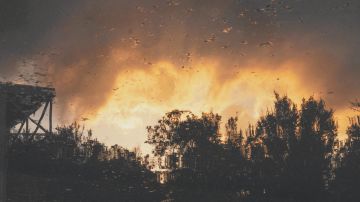Latinx Workers are STILL Working in the Midst of California Fires
In case you missed it, the northern and southern parts of California are on fire once again

Photo: Unsplash/@torzsa
In case you missed it, the northern and southern parts of California are on fire once again. These fires also continue to have a severe impact on the communities of color that both live and work in the affected areas. For example, north of Santa Rosa and in the heart of Wine Country, the Kincaid Fire has been burning for nearly a week and has already claimed more than 60 homes. In Southern California, the recent Getty Fire that began on Monday has engulfed the mountains north of Brentwood and Pacific Palisades.
While officials have called for evacuations in the affected areas, there have still been cases in which garden workers and housekeepers have still made the trek into the fires because their livelihood depends on it — and because their bosses have failed to tell them that evacuations were in order, to begin with.
A thread: Getty fire: Housekeepers, gardener go to work despite the flames – Los Angeles Times https://t.co/G6UZm8bkdD
— Brittny Mejia (@brittny_mejia) October 28, 2019
A reporter from the Los Angeles Times, Brittny Mejia, documented on Twitter how she had met a couple of housekeepers arriving at the scene of the fire rather than leaving.
“I met Carmen Solano when I spotted her taxi pulling up into a driveway. I’d just seen homes on fire a street over and immediately wondered why she was arriving instead of leaving. Turns out she was a housekeeper and had no idea the area was under mandatory evacuation,” Mejia writes in one Tweet.
Seemingly in the rush of being evacuated, the owners of these houses had neglected to remember to let the very people who worked for them (perhaps on the daily) that they should no longer make the often long commute.
Because even after workers were told to simply turn back, their first instinct was to question whether that was the right thing to do and to worry about the lost wages for that day.
“As I drove Solano out, she told me she has worked for the family for a month and a half, and she was worried about the loss of a day’s wages. She arrived from Guatemala 27 years ago and received asylum. But she doesn’t drive or speak English. She’d immigrated to the United States in the hopes of making enough money to bring her family, a goal she hasn’t accomplished,” Mejia writes in her article.
In another case, Mejia found that other gardeners who had shown up to work were still trimming and watering people’s lawns despite the ongoing fires. Still, even when an LAPD officer drove around and forced the workers to leave the area, the gardeners were hesitant to leave.
“No sir, you can’t finish your yard. You’ve got to go,” the officer said, according to the Times. “I saw their determination to finish the job.”
“…she noticed that Latino families weren’t getting the same attention as other fire victims, possibly because volunteers didn’t speak Spanish.”
This. angers. me. Undocumented immigrants grow our food & experience higher rates of poverty and…(1/ )https://t.co/dsliJR3Fv3
— Morgan Abate (@morgan_abate) October 29, 2019
In Northern California, where agricultural workers are primarily Latinx, the fires there have forced them out, meaning they’re out of the work until further notice. The Latino Community Foundation (LCF) has reactivated its fundraiser, the NorCal Wildfire Relief Fund, to help the Latinx community by assisting with relocation costs, housing issues, and other matters.
“The Kincade Fire has hit during harvest season in Wine Country — a critical time for our farmworker communities. The fire is displacing these hard-working families and destroying homes and jobs,” LCF chief executive officer Jacqueline Martinez Garcel said in an interview with SF Gate.
In 2017, they raised $1.5 million when workers couldn’t work because of mass fires.
Reminder that thousands of inmates in California are putting out wildfires for $2 dollars a day (plus an additional $1/hr when they're fighting active fires). Almost 70% of the CA inmate population is Black and Brown.https://t.co/xtzMN5bcOi
— Voto Latino (@votolatino) October 29, 2019
Also, in NorCal, inmates are once again assisting to put out the blaze.
They are working in dire situations while still being imprisoned, many of which are Latinx as well.
“Reminder that thousands of inmates in California are putting out wildfires for $2 dollars a day (plus an additional $1/hr when they’re fighting active fires). Almost 70% of the CA inmate population is Black and Brown,” tweeted Voto Latino.
Below is a clip of the incredible work that inmates are doing on the frontlines of intense flames:

















